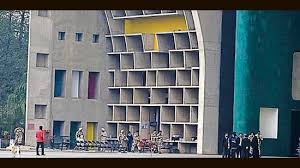NEW DELHI: The Supreme Court on Friday stayed the Punjab and Haryana High Court’s order to the Chandigarh Administration to construct a verandah outside the courtroom of its Chief Justice after Solicitor General Tushar Mehta pointed out that it would adversely affect the UNESCO heritage status of the Chandigarh Capitol Complex.
“Until further orders, the direction relating to construction of verandah before Court Room No. 01 by the Union Territory of Chandigarh Administration shall remain stayed,” a Bench led by Justice Vikram Nath said.
The Bench also stayed a contempt of court notice issued to the UT Chief Engineer by the high court on December 13, 2024, for not implementing its order for constructing the verandah outside the Chief Justice’s courtroom.
The order came on the Chandigarh Administration’s petition challenging the November 29, 2024, Punjab and Haryana High Court order on the ground that such construction would affect the UNESCO heritage status of the Chandigarh Capitol Complex where the high court building is located.
Situated in Sector-1, the Chandigarh Capitol Complex designed by French architect Le Corbusier was declared a UNESCO World Heritage Site in 2016 along with several other works by him. Spread over an area of around 100 acres, the complex houses three buildings (the Palace of Assembly which includes Punjab and Haryana legislative Assemblies, Secretariat and the Punjab and Haryana High Court) and four monuments (Open Hand Monument, Geometric Hill, Tower of Shadows and the Martyrs’ Memorial). Located in the lap of the Himalayas beyond the limits of the city, the Punjab and Haryana High Court building has been described on the HC website “as one of the most beautiful high courts in India with 40 spacious and luxuriously furnished courtrooms, three Bar rooms, a well-equipped judges’ library, a dispensary and a very good canteen.”
On behalf of the UT Administration, the Solicitor General submitted that the authorities were concerned about the international heritage status of the building. Maintaining that the Bar didn’t need the verandah, Mehta said: “The construction (of a verandah) would change the heritage structure. Constructing the verandah cannot become a subject of ego for us. We have been given a world heritage site by UNESCO.”
The Chandigarh Administration contended that if the verandah was constructed in the iconic building without the UNESCO approval, the Chandigarh Capitol Complex might lose the World Heritage Site tag. While dealing with a case related to judicial infrastructure filed by Vinod Dhaterwal in 2023, the high court had on November 29, 2024, directed the UT Administration to construct a verandah in front of Courtroom No.1 – similar to the ones that already existed in front of Courtrooms No. 2 to 9.


